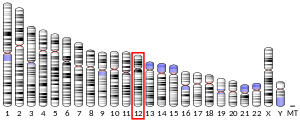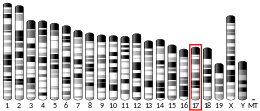DDX11
Probable ATP-dependent RNA helicase DDX11 is an enzyme that in humans is encoded by the DDX11 gene.[5]
DEAD box proteins, characterized by the conserved motif Asp-Glu-Ala-Asp (DEAD), are putative RNA helicases. They are implicated in a number of cellular processes involving alteration of RNA secondary structure such as translation initiation, nuclear and mitochondrial splicing, and ribosome and spliceosome assembly. Based on their distribution patterns, some members of this family are believed to be involved in embryogenesis, spermatogenesis, and cellular growth and division. This gene encodes a DEAD box protein, which is an enzyme that possesses both ATPase and DNA helicase activities. This gene is a homolog of the yeast CHL1 gene, and may function to maintain chromosome transmission fidelity and genome stability. Alternative splicing results in multiple transcript variants encoding distinct isoforms.[5]
References
- GRCh38: Ensembl release 89: ENSG00000013573 - Ensembl, May 2017
- GRCm38: Ensembl release 89: ENSMUSG00000035842 - Ensembl, May 2017
- "Human PubMed Reference:". National Center for Biotechnology Information, U.S. National Library of Medicine.
- "Mouse PubMed Reference:". National Center for Biotechnology Information, U.S. National Library of Medicine.
- "Entrez Gene: DDX11 DEAD/H (Asp-Glu-Ala-Asp/His) box polypeptide 11 (CHL1-like helicase homolog, S. cerevisiae)".
Further reading
- Baens M, Aerssens J, van Zand K, et al. (1996). "Isolation and regional assignment of human chromosome 12p cDNAs". Genomics. 29 (1): 44–52. doi:10.1006/geno.1995.1213. PMID 8530100.
- Frank S, Werner S (1996). "The human homologue of the yeast CHL1 gene is a novel keratinocyte growth factor-regulated gene". J. Biol. Chem. 271 (40): 24337–40. doi:10.1074/jbc.271.40.24337. PMID 8798685.
- Amann J, Valentine M, Kidd VJ, Lahti JM (1997). "Localization of chi1-related helicase genes to human chromosome regions 12p11 and 12p13: similarity between parts of these genes and conserved human telomeric-associated DNA". Genomics. 32 (2): 260–5. doi:10.1006/geno.1996.0113. PMID 8833153.
- Amann J, Kidd VJ, Lahti JM (1997). "Characterization of putative human homologues of the yeast chromosome transmission fidelity gene, CHL1". J. Biol. Chem. 272 (6): 3823–32. doi:10.1074/jbc.272.6.3823. PMID 9013641.
- Hirota Y, Lahti JM (2000). "Characterization of the enzymatic activity of hChlR1, a novel human DNA helicase". Nucleic Acids Res. 28 (4): 917–24. doi:10.1093/nar/28.4.917. PMC 102573. PMID 10648783.
- Strausberg RL, Feingold EA, Grouse LH, et al. (2003). "Generation and initial analysis of more than 15,000 full-length human and mouse cDNA sequences". Proc. Natl. Acad. Sci. U.S.A. 99 (26): 16899–903. doi:10.1073/pnas.242603899. PMC 139241. PMID 12477932.
- Ota T, Suzuki Y, Nishikawa T, et al. (2004). "Complete sequencing and characterization of 21,243 full-length human cDNAs". Nat. Genet. 36 (1): 40–5. doi:10.1038/ng1285. PMID 14702039.
- Gerhard DS, Wagner L, Feingold EA, et al. (2004). "The status, quality, and expansion of the NIH full-length cDNA project: the Mammalian Gene Collection (MGC)". Genome Res. 14 (10B): 2121–7. doi:10.1101/gr.2596504. PMC 528928. PMID 15489334.
- Vasa-Nicotera M, Brouilette S, Mangino M, et al. (2005). "Mapping of a major locus that determines telomere length in humans". Am. J. Hum. Genet. 76 (1): 147–51. doi:10.1086/426734. PMC 1196417. PMID 15520935.
- Parish JL, Rosa J, Wang X, et al. (2007). "The DNA helicase ChlR1 is required for sister chromatid cohesion in mammalian cells". J. Cell Sci. 119 (Pt 23): 4857–65. doi:10.1242/jcs.03262. PMID 17105772.
- Parish JL, Bean AM, Park RB, Androphy EJ (2007). "ChlR1 is required for loading papillomavirus E2 onto mitotic chromosomes and viral genome maintenance". Mol. Cell. 24 (6): 867–76. doi:10.1016/j.molcel.2006.11.005. PMID 17189189.



